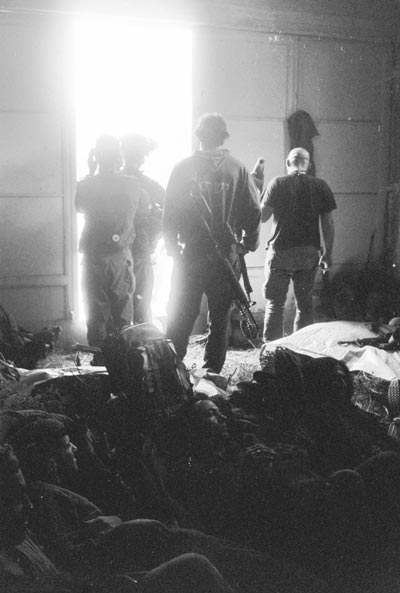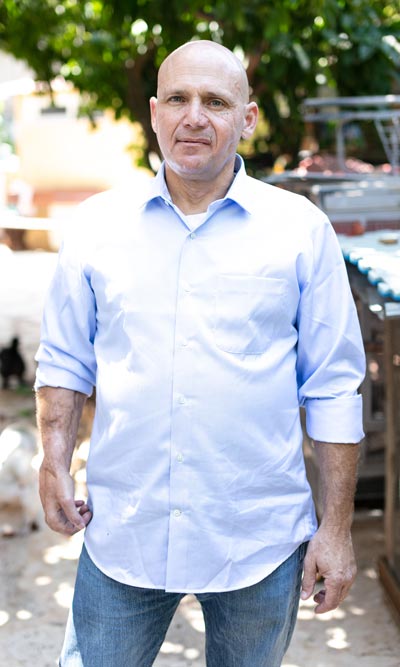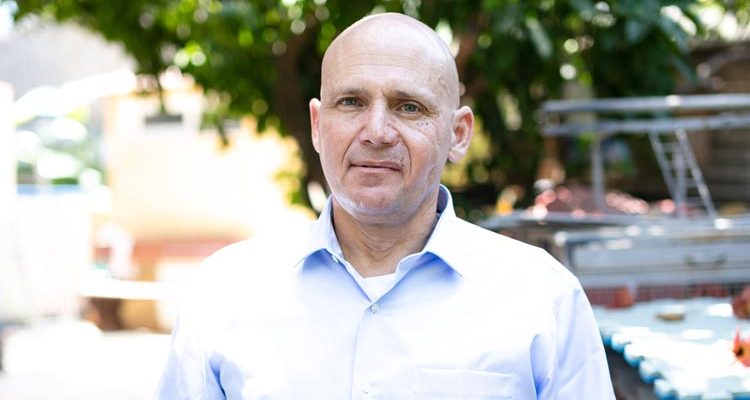“I want to hope that we get better.”
A day does not go by in which Dr. David Shashar does not remember two young paramedics who were close to him in one of the most difficult incidents of the Second Lebanon War and were killed: Idan Kobi and Adi Salim, their memory blessed.
“Their memory, their faces, are in front of my eyes every day,” he recalled. “I see the adventure and smile of Idan and the leadership and optimism of Adi, and they are a significant focus of strength for me.”
In that same incident, a Hezbollah force fired two missiles at a building on the outskirts of the village of Debel in southern Lebanon killing nine Israeli fighters. Shashar was severely wounded, lost function in his right hand, and absorbed shrapnel, which he still carries in his body.
When did you find out that Idan and Adi were killed?
“I received the news only after the war, when I woke up in the ward at Tel Hashomer Hospital. My sister and mother told me. As a Battalion Doctor, I felt it was my duty and responsibility to return my soldiers home safely, but that did not happen,” Shashar notes. “To this day, I am in close contact with Adi’s parents and sisters.”
In the 15 years since the war, many things have happened to Shashar. He completed an exhausting four-year rehabilitation process, completed his internship in obstetrics and gynecology, met his wife and had three children, completed a Master’s degree in Medical Engineering at the Technion in Haifa and a degree in Business Administration from Tel Aviv University. He also replaced his dream of combining surgery and gynecology with an innovative medical start-up.
Shashar was born and raised in Jerusalem. He served as a fighter in the 7th Armored Brigade Tank Corps. In the reserves, he served as a doctor in the Special Forces Engineering Unit of the 98th Paratroopers Brigade.

At the end of July 2006, two weeks after the war broke out, he and his comrades received an emergency call-up. He was then towards the end of his medical internship period, yet ten days later he and his unit entered Lebanese territory.
“The orders were constantly being changed, and eventually, we were instructed to enter Lebanon on the night between August 8-9. The entire brigade marched in on foot, in one long single file, carrying all of the equipment on our backs”, recalls Shashar. “Our destination was the village of Rachaf, from which Katyusha rockets and missiles were fired at the north of the country. We were three doctors; we were split up so that each of us was attached to one Company with several paramedics. I joined Company A, with Idan and Adi. The original plan had been to split up into smaller squads, spend our day-time hours inside the village houses and move forward at nighttime towards Rachaf village, to operate against the launching squads.”
Change in Plans
However, plans had changed. The Brigade set-off considerably late at night. The Battalion companies attached to the Special Forces Engineering Unit, arrived at the village of Debel only at sunrise. The Battalion and Regimental Commanders ordered the 100 fighters of Companies A and B to enter a partially built, two-story building on the outskirts of the village, and to stay put until the evening hours. An attempt by the Company Commander, Shashar and other officers to move one of the companies to a less crowded house not on the outskirts of the village, was not approved. Some of the fighters broke through the metal door of the Za’atar warehouse on the first floor of the building and Company A, with Shashar and paramedics Idan and Adi, went in and settled in it.
“At 1:23 in afternoon the first anti-tank missile was fired,” Shashar recalls. “I heard a loud boom and I remember myself saying, ‘My God, they hit us.’ I stood in the warehouse and saw smoke and dust and light emanating from the perforated metal door. I found myself walking towards the light, looking at my right hand that had sustained a significant hit and was hanging on the verge of tearing from the missile shrapnel and from the door that had itself turned into shrapnel. I took a tourniquet out of my pocket and gave it to one of the officers next to me – and from there my memory is blurred from the injury, the morphine I received and also the loss of blood. I and the other victims were immediately evacuated to a nearby olive grove.”
Then the second missile was fired, this time also hitting the soldiers of Company B, who had come down from the second floor to help with the rescue of Company A. Within minutes, the two companies found themselves with dead soldiers. These included Yahav, the Company Commander, as well as 29 casualties of varying degrees of injury. The lifesaving treatments that day were administered and led by two other Battalion Doctors and the medics working alongside them. Many difficulties were encountered during evacuation, and eventually, other reserves doctors who had been fighting in the sector, loaded the wounded on stretchers and led them running on foot back into Israeli territory.
“They put us on helicopters and ambulances and evacuated us to hospitals,” he recalls. “I was flown to Rambam Medical Center in Haifa, where my condition was stabilized.”

Technology and Medicine
With chest wounds and injuries to his hand and face, Shashar was put under sedation for ten days. When he woke up, he was transferred to the Orthopedic department, and from there for a period of two months at the Rehabilitation Center of Tel Hashomer Hospital. In the following years, he underwent a series of surgeries in the unsuccessful effort to return his nearly severed right hand to function.
“There was a struggle over whether to amputate the hand and attach a prosthesis, but I decided to preserve it,” explains Shashar. “At that time, I was back to completing my internship, and working at Tel Hashomer, not as a gynecologist but as a researcher. I had to come to terms with the fact that I would no longer be a gynecologist-surgeon and was looking for a different horizon.”
And you found one?
“There were peers and colleagues who entered the field of Biotech, which combines medicine and high-tech. I studied Medical Engineering at the Technion and Business Administration at Tel Aviv University, and at the same time, I established with others an entrepreneurship network, which was a collaboration between doctors and engineers.” He continues his explanation: “The goal was to pinpoint medical needs, which hitherto do not have a satisfying solution, and with the help of joint thinking and brainstorming, find innovative technological solutions, develop a prototype, raise funds, register patents, and so on. Later, I developed a similar system at Tel Aviv University, and I am very proud of these two frameworks. ”
What is the main idea?
“To train students from all disciplines – medicine, engineering, business administration and others – in medical entrepreneurship. In a methodological process we have built, doctors are raising and bringing forth medical problems that have no solution, and together in brainstorming, everyone mobilizes to find the technological solution. In retrospect, this led me to my main venture today, “Pregnantech”, which develops a device for preventing preterm birth, a company I founded with another doctor and engineering friends”.
How did you get to that?
“This start-up also began following a problem which had surfaced: preterm delivery and the birth of preemies. Medicine in this field has not advanced much in the past decades,” Shashar reflects. “I believe the groundbreaking solution we initiated, and are promoting, will bring about change and significantly reduce the illness and mortality of millions of babies worldwide. I left my job at Tel Hashomer Hospital, and with the help of an investment and financing group from the Innovation Authority’s Incubator Program, our device, all made in Israel, has already undergone its first clinical trial. We will soon begin clinical trials in Israel on pregnant women in risk of a premature delivery. The work is fascinating and diverse; I’m surrounded by excellent people and am very much enjoying the journey”.
Looking back over 15 years, what do you think today about the Second Lebanon War?
“First of all, I think of Adi and Idan and those who lost their lives in that war. The decision-making process in our particular incident was flawed. Beyond that, I think about the meaning of the war, and whether we have learned anything since. The IDF had set out to free its two abducted reservists, Eldad Regev and Udi Goldwasser, a worthy mission. I wonder if we, as a people, have improved over the past 15 years. Have we become better, more united? Has our sense of commitment, brotherhood and mutual help increased?”.
And what is the answer?
“I prefer that everyone answer this question for themselves,” Shashar replies. “I, anyway, want to hope that in the next 15 years we will get better.”
Over the years, Dr. Shashar has represented the Zahal Disabled Veterans Organization and Beit Halochem as a guest speaker at numerous fundraising and awareness events around the world, events organized by Friends of Beit Halochem in the USA, Canada and Australia.
Story by Dudu Levy Reich
Photos by Benny Adam

Comments are closed.